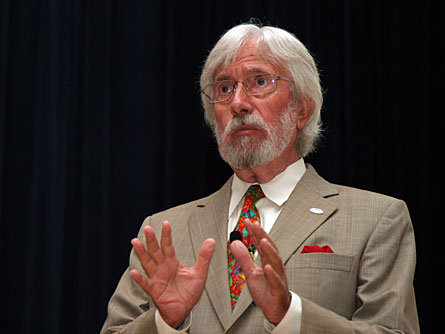Cousteau finds “hypocrisy” in scientific whaling
Jean-Michel Cousteau has traveled the world chronicling life under the sea, including whales — first with his father Jacques, now as a explorer-videographer and president of the Ocean Futures Society. This morning, he took issue with the idea that Japan and other countries are conducting legitimate research when they kill whales in the name of science.

His venue: the speaker’s platform in a breakfast-time keynote address to the Annual Green Chemistry and Engineering Conference. It was sponsored by the American Chemical Society and convened at the University of Maryland in College Park.
Whales are supposed to be protected the world over, with a few exceptions. But Cousteau maintains that some nations are simply “lying” when they claim to no longer be commercially whaling. Take Japan, he says. It conducts a program to ostensibly do research on whales — for the whales’ sake — that involves collecting and dissecting specimens. (As I noted in yesterday’s blog, Japanese researchers have permission to slaughter more than 1,000 a year in the name of science.)
Yet if whale meat is collected solely for study, he asks, why did he find it on restaurant menus when he visited Japan a few weeks back? He reported that some Japanese schools even serve whale meat in lunchrooms to kindergartners with the goal of preserving a “cultural” preference for whale in the diet of a new generation.
Bottom line, he charges, with regard to Japan’s scientific whaling, “There’s a lot of hypocrisy.”
Perhaps. But as distasteful as I personally find the idea of hunting whales, Cousteau did no make an iron-clad case for Japan doing anything illegal.
According to the Japan Whaling Association, despite an ostensible “global ban” on whaling, the International Whaling Commission permits “small-type whaling” in regions outside of its jurisdiction. For instance, the JWA notes on its website, “Catches of small cetaceans including Baird’s beaked whales, pilot whales and Dall’s porpoises occur within Japanese coastal waters . . . outside the International Whaling Commission’s jurisdiction. The Government of Japan strictly regulates these operations.” In addition, the Japanese whaling group says that “small cetaceans caught either in directed fisheries or incidentally in other fisheries are used for human consumption in many countries around the world.”
It’s therefore possible that any whale meat on Japanese menus has come through such legal channels.
Cousteau also charged that through “cheating,” some countries have been thwarting the IWC’s attempts to protect whales. For instance, he said that a few countries issue restrictive domestic licenses to hunt whales in coastal waters that are under their territorial control. License holders sometimes sell the whale-hunting rights to outsiders, Cousteau said. The inference: Such a practice could circumvent IWC’s attempts to limit whale harvests only to programs that satisfy small-scale, local cultural practices.
If this license-shifting claim proves true, it might explain another issue Cousteau raised today: that DNA analyses show some whale meat in local markets around the world does not come from the species purportedly being sold — and therefore is, presumably, a species that should not be in commerce.
Cousteau and I have made tentative plans to talk in a week or so about this widespread “business” of unsustainably exploiting ocean resources.







